This is a rather long episode, I’m afraid! I was without internet for eleven days, and then, having uploaded all this, I pressed ‘publish’ at the very moment the power failed in Kitale. It’s now uploaded by Rico’s mechanical knowledge, powering the router and our devices from his car battery and an inverter. We have had no power for 24 hours – so far. Life in Africa…

I could well be the ONLY foreign tourist in eastern Uganda this week. “How many tourists are coming through these days?” I asked one of the officials at the small Suam River border.
“I came on duty one month ago, and you are the only one I have seen.”
*
“We are expecting it today. Come today!” shouts Harison, the Medical Officer of Health for Suam border, into his phone on Friday morning, in answer to my query about my £50 Covid test result.
“But your regulation is for a test within 72 hours of entry. It’s already almost 96 hours!”
“No problem. Come today!”
It takes an hour of extreme dust to reach Suam. “You are back! Go and see first, then come back to complete the formalities,” suggests the Kenyan immigration officer sensibly, recognising me from Monday. So I walk over the tumbledown bridge with its twisted railings over the rock-filled trickle of the Suam river. The Ugandan post is a place of dust-covered tents, an ancient round prefabricated zinc hut from colonial times, some down-at-heel offices brown with dust, all set in red dust and ruts.
Harison comes down the broken embankments waving a colourful – unsurprisingly negative – test result. “Now you will be OK! You will have no trouble.” And formalities are simple and filled with smiles. “Welcome to Uganda!” I find a certain irony in the fact that my own ‘developed’ country is today discussing imposing the requirement for this negative Covid test for incoming travellers. It’s been in place in Uganda and Kenya since March… I laugh with Harison at this discrepancy. He is astonished: “We have been doing this since the beginning…”
*

I ride off into remote rural Uganda. The sun is hot. The views are wonderful. Ugandans could contest for the friendliest nation in Africa. People watch me pass, amazed. Everyone reacts to a smile and a wave, when I can take my hands off the bucking bars. Children shout excitedly from the roadside and fields. Infrequent drivers lurching the other way give an ironic wave and greeting. It’s fun to be here, an apparently old ‘slebrity’ (as Alex delightfully mis-spelled in an email) on a piki-piki.
In a few years, maybe even next year on the Kenyan side, but another three or four, I reckon, on the Uganda side, where they have some difficult topography to deal with, there will be a fine tarred road. ‘Just in time for a 75 year old adventure biker to be grateful for a smooth road,’ I think, as I lurch and bump over one of the worst trails of my considerable experience. It’s about 75 or 80 miles from Kitale to Sipi, my Uganda base. At present perhaps 20 miles are tarred, another 15 reasonably graded earth and gravel as the new road reaches slowly westwards, and the remaining 40 miles some of the most serious trail riding imaginable. Fortunately, my little Mosquito can handle it and I now know the machine well enough to make most of the rough stuff fun.
Tired, I stop as often I have done, at the straggly habitation of Kabukwo for chai at the Star Hotel, a very basic tea shack beneath rusty zinc sheets. Sitting on a low bench polished by tens of thousands of backsides, I sip from the scalding tin mug of over-sweet, reviving, milky tea. Soon I am in conversation with a young boy and Pastor Christopher. They are pleased to quiz me; not many strangers come this way. Always the same questions: how many children, what religion, which football team. It’s useless to try to change their long-held traditional belief that having more and more children is the aim of every life. These people have seven each as an average. Many will have ten, fifteen, even twenty – all on the very verge of abject poverty and total illiteracy. Uganda has the second youngest population in the world, with a median age of 15.9 years. (Mali is 15.4. UK is over 40). There are children everywhere and teenagers already have babies at their backs. Uganda had a population of about six million in the 1950s. Now it has over 55 million. By 2050 it will double again to over one hundred million. But no one sees my logic, that if you keep dividing your inheritance of land between so many, they will end up with about enough to stand on. “But what if you have two girls?” comes the inevitable question, when I opine that two is enough and the planet is running out of time to deal with this explosion. Girls have little value, except for the dowry they will bring, and as producer of ever more babies.
“Soon you will reach the tar road!” Pastor Christopher assures me. “You will be in Kapchorwa in under one hour!” Obviously he hasn’t actually driven this way, for the tar is still twenty or thirty kilometres off, and between here and that anticipated delight, are many miles of gravel and earth as the Chinese build the new road, and Uganda an ever-increasing debt to the Chinese government. A debt that they will never repay, except in handing out their natural resources and land to a country with interest in profit not the planet. Where bridges are still being built, even when I eventually reach the tar, there are deep dusty and earthy diversions across cabbage fields and rocky river beds.
By the time I reach Kapchorwa, I am exhausted. I stop to use the ATM in the bank lobby. My temperature is taken, I am expected to wash my hands and some disinfectant nastiness is sprayed on my palms before I am allowed inside. I never had my temperature taken in England yet. Today I am hot – 37.2. Not surprising where I’ve been, leaping about on my piki-piki in jacket, helmet, gloves, boots and goggles. Now, though, I am only fifteen miles or so from welcome, rest and noisy greetings from Precious and the children. I ride, hooting, down the last dusty track to Alex and Precious’s Rock Gardens guest house, named after my own house. People recognise me now. They wave cheerfully. Precious comes, arms helicoptering in excitement. My two year old namesake, Jonathan – named for me and nicknamed ‘JB’ – erupts in wails of horror. There are just two reactions to mzungus from small children – fascination or terror. Jonathan selects the latter, and stays that way for my stay. Keilah, now three, is reserved but no longer afraid. Alex is out when I arrive. Elections are in full furore at present. The crook Museveni, the president, in power for over 34 years, plans to win once more, whatever it takes. Alex is campaigning for his local candidate. The opposition is led by a pop star called Bobi Wine. He’s popular with all the younger voters. He’s getting world media attention for his campaign, and for his frequent arrests on trumped up charges (funny, I never saw the relevance of ‘trumped up’ until I typed it…), and the deaths of his supporters and aides. It’s a disgusting process, this election. Corruption will win it for the incumbent as always. There will be much drunkenness and most votes are simply bought from uneducated electors more interested in 25 ’pennorth of hard booze than their prospects for the next five years. Undoubtedly, this will be the most corrupt, unrepresentative election I will ever witness.
*


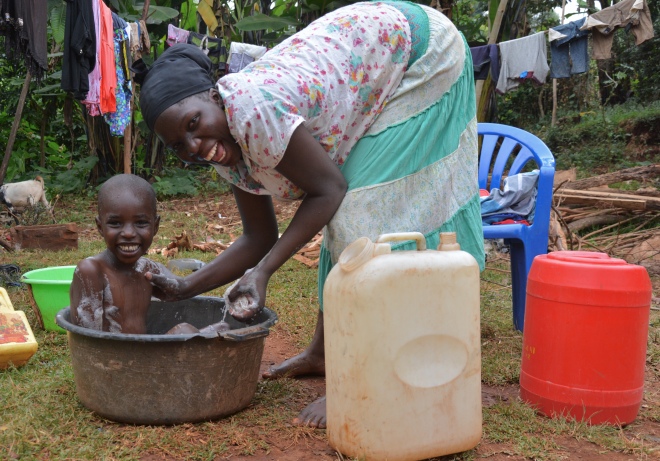
Jonathan’s House awaits me, decorated with tinsel and intricately folded towels. Precious’s presentation skills are way beyond the simplicity of the nascent guest house. She is excited. She greets me in the traditional way, by going down on one knee before me. Put out of work at the beginning of the lockdown in March, Alex has not worked since. There’s no government ‘furlough’ or state assistance. All the money donated from outside to help combat the virus has been filtered away into the government officers’ bank accounts. “Let them rot in the villages,” Alex’s employer in the hotel in Kapchorwa was heard to say. And without the small help I gave him, paying his salary for nine or ten months, the family would have been in dire straights. Precious gushes and mumbles her thanks alternately, overcome by emotion. It’s humbling to be so appreciated. They’ve never asked, just blessed me constantly for my assistance. And I can see that Alex, a man of great integrity, has used his time, and my small payments, with determination and honesty. The raised bar/ restaurant of which he has dreamed for so long, has developed a lot since I left in February. He calls it ‘1818’, a suggestion of Rico and I when we were here in January and saw its altitude on Rico’s dashboard instrument. It’s 1818 metres above sea level. Alex has worked on the building, raised three metres on posts to catch the view into the valley behind the matoke trees – the savoury banana that is the staple diet through much of Uganda.
Peasant life in rural Africa is incredibly hard. And if you are born to this state with intelligence and integrity, charm and ambition, the challenges for most of us would be overwhelming. Most cook over small open fires on the compound floor. When it rains, as it did – very hard – through Sunday night, the place turns to clayey red mud. Rivers run through the yards and mud coats everything, especially the small children. As the rain roars on the tin roof of the mud and stick-built kitchen into which Alex and Precious have retreated to make my breakfast, we have to shout to make ourselves heard. We inhabit a world of red mud. “We don’t expect rain like this at this time,” says Alex making chapatis on a charcoal burner on the the wet floor, as Precious mops out with an old skirt. The rain beats a tattoo on the unlined zinc roof and cascades make a curtain at the door, falling into the rivers of mud that are everywhere. The children are smothered in mud, their decrepit shoes and sandals filled with red glue. Precious drops big cooking pots under the brown rain tumbling from the roof. Nothing wasted. Alex rolls chapatis on the floured top of a low stool and boils milk, water and tea in a blackened, lidless kettle for my chai. Precious can pick searing hot ashy saucepans and kettles from the fire with her bare hands. I can’t even touch the burning metal. “Oh, I am an African woman!” she laughs widely, mud from the ankles down, as she juggles pans and rinses a miscellany of mismatched plates, more cold water splashing into the mud of the floor. Keilah sits with a serious face chewing chapati in a child’s plastic armchair from China and the other Jonathan screams and hides behind his mother, terrified as yet of his mzungu uncle. The cooking knife has no handle, fresh water comes in plastic containers from a tap outside that only dribbles at night, the legs of the ubiquitous plastic Chinese chairs are stained red with mud. It’s just a touch above subsistence life. But subsistence life with so much ambition and drive from determined Alex. He brings a delicate china coffee cup he has gleaned from somewhere for my milky chai. The milk is straight from a cow across the muddy track amongst the matoke trees. “I’m sure my neighbour has been putting water in the milk, so I went myself,” Alex explains, cutting pineapple and passion fruits decoratively onto a green plate as if he’s in the Kampala hotel where he was so popular, but always cheated by unscrupulous employers – the fate of those with integrity in Uganda.
Alex’s wellies are mud blathered at the door before the wall of rain. Precious thoughtfully bought them for my visit last year, but they are three sizes too small for me. My slippery flip-flops will do in this deluge. We slide about in the mud of the compound. “This rain will make the coffee flower.” Alex knows I’m always interested in life about me. “Last year we had NO coffee at all here, the rain was TOO much. The weather, it is changing…” If the Climate Change deniers had the humility to look at Uganda – or anywhere else in Africa, they may think again. But driven by blind arrogance and greed, they’ll never see this squalor and the suffering crop failures produce here.
*
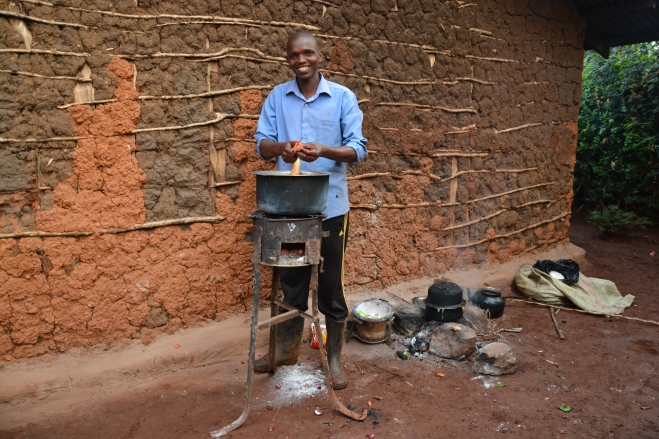

At least for a day the torrents will dampen the election fervour that is overrunning the rural village with noise and drunkenness. Fighting too, when candidates come to buy their votes. The price of a vote here? About four and a half English pence… That’s approximately what candidates hand out to the villagers here in the hope of a vote. The candidate with the biggest bank balance, and the most determination to cheat his or her way into lucrative local contracts, is the one that wins. Meanwhile, small lorries weighed down by vast loudspeakers pump pop music into the matoke trees as they pass on the narrow tracks. The populous runs behind to be at the front of the handout of pennies, enough to buy a box of matches. Fighting ensues and we even had reports of a shooting in the nearby trading centre. Everything went very quiet after THAT! The President has instructed the military to ‘shoot on sight’ at any disturbances at polling stations. The iron hand of a government that doesn’t care a jot and regularly arrests the opposition candidate, Bobi Wine, and imprisons his supporters on specious excuses. “What about international observers?” I naively ask Alex. “Oh, they go to a few polling stations where the officers are warned in advance. They look and drive off in their big vehicles.” This is an election split between the youth and the traditional older generations and mass of uneducated, who don’t like change and have been bought off over the years by an astonishingly corrupt leader and his cohorts. The opposition just gets locked up. And this man, Museveni, with so many lives to his account (actually of Rwandan stock) originally came to power to stamp out the corruption of the previous incumbent – back in the early 1980s, accusing Obote for ‘staying too long’. Rich irony: Museveni has been in power for 34 years, changed the constitution by force to remain in power long beyond the 75 years age limit allowed in his own constitution.
“Huh! Our parliament is nothing more than a casino!” someone opined in conversation. “You get there by gambling. And Museveni is there, the big owner of the casino!”
*

I photographed two girls one afternoon, mainly because they were obviously hanging about the house in wait for my camera. I always like to note down the names of my subjects, but I couldn’t understand their names, so I passed over my little notebook and pen. It was then that I realised that these two girls, about fourteen years old, couldn’t even write their own names. In clumsy capitals they wrote ‘WNNE’ and ‘BRIDGT’. Soon these two girls, from a village below the escarpment that Alex says has only the most basic education, will be mothers, to another illiterate generation. “They know money better, those girls. Always wanting money… They sell tomatoes all around the area. Only money…”
“And the churches do nothing!” I exclaim, shocked, to Alex and his friend as we sit in the dark. “And the government cares nothing for the state of the people and the overpopulation of the planet. All they want is money.”
“The churches don’t even TALK about sex,” says Alex, putting on for a moment his mentor’s hat, the voluntary work he does with the local reproductive health centre to attempt to control the rampant birthrate, FGM and bring equality for girls. His friends says disgustedly, “All the churches came out for Museveni, endorsed him. The Catholic of course, but even the protestant, all of them. And you know what sort of cars they got? V8! Very big!” This is such a corrupt country, from the billionaire president – who will shortly be elected again – to the pettiest officials. When Alex’s employer at the hotel in the next town peremptorily closed his business at the beginning of the Covid crisis, he was heard to say, “Let them rot in the villages.” That’s pretty much the attitude of all who claw their way up the greasy ladder of wealth in Uganda. The candidate probably set to win this parliamentary seat, is a crook. Leaving school before O levels, he literally printed money – counterfeit notes, many of which were laundered by government officials – and his own qualifications. So this ill-educated candidate has the most money to give out in small notes to buy votes. Mind you, the incumbent has a low attendance and record of 0.037 involvement at the parliament, and he left school at Primary 7, so maybe a money faker without O levels can’t do much worse..? Another local candidate was discovered three days before the election with two full boxes of votes already-cast in her favour. No one ventures to disqualify her. The ruling party knows she won’t win anyway, so why bother? They’ve tied this election up months ago. It’s only a form they have to go through at huge taxpayer expense. Votes are usually cast on clan, tribal and religious lines – and those who buy the most votes.
*
The cost of a vote? Well, now I’ve seen it for myself. I have photos of villagers lining up by the hundreds in a remote village to receive a 25p handout from a prospective candidate. “Oh, I am lucky,” he exclaimed through his megaphone to the watching crowd, “I even have a white visitor to my rally!” I gave him a thumbs up from the crowd, to the delight of the village. They see very few mzungus out there in the depths of the sticks. I do stand out rather, the only white skin in two or three hundred villagers, the sinecure of all eyes.
Why were we in the distant areas below the big escarpment? We had decided to visit Alex’s sister, Doreen. Rashly, I’d suggested we could walk. I didn’t actually know it would be a very long trek of about 25 or more kilometres on broken tracks and ending up clambering straight back up the cliff sides in the pitch dark to get home, some 500 or 600 feet up, stumbling – at the end of 16 odd miles – over big rocks on black footpaths between the matoke. “I must just tell you that this mzungu can’t see in the dark!” I had to complain to Alex and his junior brother Nic, who accompanied us on the trek. I have often noted that those who live in the dark seem able to SEE in the dark. Nic and Alex scrambled sure-footedly upwards in the vaguely starlit dark. I trailed along, just about able to make out Nic’s white trousers, thankful for the 25p torch they had sent an acquaintance to purchase from some small country shack amongst the dark fields.

We set off in the morning, through the matoke shambas to the lip of the great cliffs, from where the vast view into the west was hidden in mists. By good fortune we’d picked a cloudy day for our expedition. Steep metal ladders descend the cliffs here and there to help in the steep ways down to a gravel road far below. Everywhere we went, I was a celebrity, an ‘old’ white man who was being punished by his young guides and should just be put on a boda-boda for the rest of the journey. I don’t exaggerate that I greeted a thousand people lining the track-side. Children called, ‘old’ folk (generally a decade younger than me) made jokes, youths just wondered. “You must think young!” I proclaimed to elderly men and women, many of them anticipating the entertainment of noisy visits by prospective candidates and their supporters. No one seemed to be working the fields; the children aren’t at school – “Maybe they’ll go back after the election…” people say doubtfully. The government doesn’t care anyway.
This was the longest walk that I have taken in years. Even young Nic, about 20 years old, overslept next morning and Alex was hobbling by the time we reached home at 8.20. ‘No point giving in,’ my mother used to say – and I maintained my self respect with two men less than half my age! By the end I was running on determination alone.
*

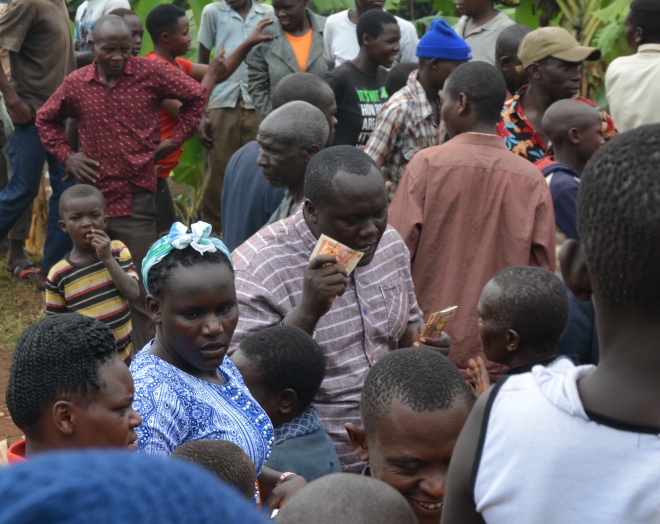
Election fever hotted up as the days went on. A rather strikingly good looking young woman candidate came to visit us here in the rural village. It’s her clan – an all-important relation here in Uganda. Her entourage stopped next door to Rock Gardens, where she made a speech, the parts of which Alex translated, sounding pretty relevant: calling Museveni to account for his inactions, rather than voting blindly for a man who has syphoned away billions of dollars in aid and international help, sharing it with the iron-fisted cronies of his own western clan and with the military authorities. But the villagers hadn’t come for the speeches. They’d turned out, running through the matoke shambas, for the pennies that would be distributed. With great acclaim, the independent candidate’s campaign team announced that she had brought 200,000 Uganda shillings (£40) for the four local villages. Not for a useful community project of course, for tiny sums for individuals. As soon as she left, unseemly chaos ensued. Fists were shaken and women screeched. Youths fought. Men tore at one another. Shouts and angry voices erupted. A major disagreement was caused by the apparent unfairness that the four hamlets are of differing sizes. People chased one another, clutching at skirts and jackets, screaming in anger. It was a shockingly undignified squabble over a few pennies. This is certainly not an election about causes, beliefs, ideologies or manifestos. It’s about money – who has it (the politicians) and who doesn’t (the voters). Undoubtedly the most corrupt, squalid election I’ll ever witness. Later, I had Precious and her mother in law line up for a photo, showing me in their open palms, the two 100 bob coins they had won. 200 bob is about 4.5 pence, and will buy a box of matches. “Oh,” laughs Precious, “but if I collect another 300 bob from other candidates, I have enough to buy washing soap!”
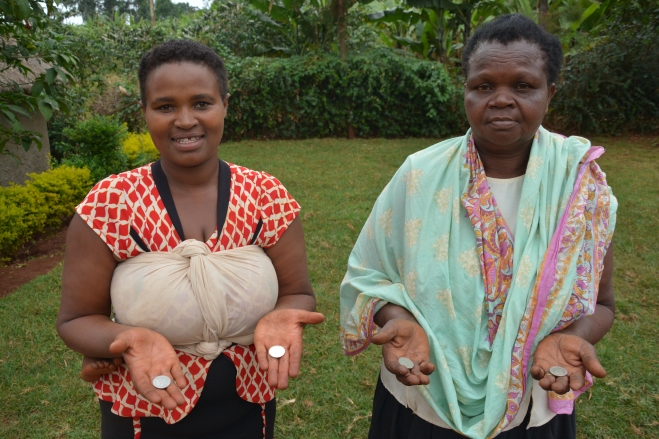
*
Precious comes from western Uganda, far across the country. It’s a beautiful region that I have enjoyed several times. Her parents live on an island in scenic Lake Bunyoni. Her mother married at 14 and began giving birth soon after. Precious’s two older siblings were born from 1992, she herself in 1995. Her father is a teacher, so he taught his children to read and write, despite the fact that most education is considered wasted on girl children in Uganda. What’s the point? They will be married while still children and their responsibilities are motherhood and serving their men. Precious’s siblings taught their mother to read and write themselves. Precious is one of 11 children…
Her mother, constantly pregnant through Precious’s childhood, is probably in her mid-forties now. After the seventh birth, Precious dared to suggest that perhaps this was enough. Her advice caused pandemonium. “Eh! They wouldn’t speak to me for TWO yeeears!”
Precious and Alex intend to limit their family to two children. “How can I educate and feed more?” he asks. “Already it is difficult. School fees for Keilah alone are £100. Where do I get that money – without you this year?” Alex is a keen ‘Champion’, advising and mentoring – against the greatest traditional odds – against large families and encouraging the equality of girls. Subjects that bring opposition amongst rural peasants. How he keeps his spirits, I never know.
*
Thursday 14th January was the great day in Uganda when nothing would change. I had anticipated a corrupt election, but not on the scale I witnessed. No vote was cast locally without it was bought. It is the norm. You sell your future to the richest, probably most ruthless candidate, who will ‘serve’ for the next five years, make decisions that will affect your family and life – for a few pennies. More likely he or she will merely endorse the decisions of one of Africa’s personally richest, least caring presidents. If they don’t, they lose their privileges and rewards.
“People are ruuuunning!” laughs Precious at breakfast time. “They are giiiving out money!”
“Candidates and agents are running door to door, handing out money!” adds Alex, somewhat ashamed. “My candidate has failed to get more money… On the last day.” (So HE won’t win.) Of course, they raise the money on promises of favours if they come to power. “The crooks are sitting in the matoke with hands full of money!” It’s rotten all the way through. “There are lines sitting at the polling station waiting to be paid!” Throughout the day, neighbours came demanding money from Alex, knowing he’d been canvassing on behalf of his local candidate – whose money was expended. The choices locally are between the crook who counterfeits money, laundered by government officials; a woman who prepared her own filled ballot boxes; a man who left school before O levels, bought his qualifications and has ‘served’ the district as MP for five years. His record of speaking in parliamentary debates is just 0.037% – (one of the two occasions was in agreeing to Museveni’s change to his own constitution that enabled him to continue in power, a mandate opposed by most local people, his constituents); and a few independents who haven’t a chance anyway as it’s not about policies but how many votes can be bought on the day for a few bob outside the polling station.
Call it by what it is – it’s plain bribery, in full sight and sanctioned by the president and his cronies. As Trump and Johnson have proved, tell lies long enough and almost half the electorate believe you. It may be politically incorrect, but democracy without education just doesn’t work. If it did, Trump would still be a second rate TV personality, I’d still be a European, not a Little Briton, and Alex would not live in a country hijacked by crooks. “This is only pseudo democracy,” says Alex with a contemptuous shake of the head. “BULLSHIT!” he exclaims exasperatedly, summing up so well what this charade is about.
Kampala was closed down and militarised. The government drafted in vicious troops from Somalia, an experienced war-torn land, to repress its people. “There are troop tents in all the streets and military guards on all the buildings. Nothing moving in or out of the capital. Kampala is only soldiers,” Alex’s brother Cedric tells us, arriving from the capital in the morning; with great integrity, he’s come home to vote. It was said that the opposition candidate, pop star Bobi Wine, was taking refuge in the American embassy, his whole campaign team arrested on some pretext while campaigning on one of the islands in Lake Victoria.
In the late afternoon, I accompanied Alex to the count, on a grassy hillside in front of a school building. The views across the valley were sunny and delicate behind the gathered agents and assistants. The returning officer emptied a box of ballots onto a sheet of black plastic on the ground and assistants – including young Nic – fell on their knees to sort the papers correct way round. The returning officer then held each paper high and announced the vote thereon, passing it to the relevant agent. This is a conservative place and we all knew that most would vote for Museveni as he has had longest to buy loyalty – 34 years of bribery of the uneducated. Sure enough, 176 votes were cast for him, but there was some excitement amongst my friends that Bobi Wine totalled 31 votes from the younger voters, claimed as a victory in such a hidebound constituency. “If he can do that in this village, most of his support is in the towns and cities!” Only about 200 people bothered to vote, perhaps 40% of those eligible – the others had merely taken the various bribe monies and stayed home.
It wasn’t an election. It was an auction.
*

On Friday we heard that the crook had carried the day for local MP; he with the deepest pockets. He’s known for faking notes of several nations, then burning the counterfeits in collusion with high bank officials commissioned to destroy old bank notes, which then slip back into circulation. He’s also known well amongst the government mafia, working with corrupt politicians. He left school before O level and faked his own papers. One of his teachers told me himself that he dropped out of school and stole a cow to start on his career – now to Member of Parliament for the district. Few are even ashamed of his record. He’s been ‘successful’, manipulated the system. So now the Sipi district really can be sure it has criminals in charge from bottom to top.
People still wait for more handouts – now for local officials’ posts… The system is ingrained and established. Only a revolution – or universal education – can solve things now. Nothing changes. African ‘democracy’ in action. It makes me proud of Ghana, who have largely managed to reduce the tribal system to less importance than national pride, and have free and fair elections with peaceful handover of power. It’s rare on this continent.
Sure enough, on Saturday, we hear that Museveni will be president again. What a surprise. Like so many long ‘serving’ African leaders, he will have to die in office to save the ignominy of being dragged to international courts on charges against human rights, and to protect his vast personal wealth. It is suspected that the votes were consistently rigged against the pop singer, so popular with younger and urban voters. Museveni’s stronghold is western Uganda, the region from which he comes, and that has received most of his bounty over the 34 years. Voting is partisan, as is the corruption.
*

I gave Alex money for two more lorry loads of rough stone to construct the lower levels of 1818, his new bar and restaurant. He began his project with insufficient engineering knowledge. Now he must support the raised timber bar on strong stone piers. Sadly, in his enthusiasm, he started with the decoration and twiddly bits. For safety, his heavy upper structure requires a lot of support. Once he assures that, he will fence the compound for privacy and security, construct a more pleasant latrine – “It’s OK for me,” I said, “but your visitors won’t accept it! Locals like to keep their pride intact.” Then he and Precious will open for business, a pleasant bar for meetings, small conventions, and quiet visitors. By charging more for their services they can keep out the drunks, says Alex! Since March and lockdown, he has left his job at the hotel in Kapchorwa and concentrated his efforts at Rock Gardens. He is admired by his late colleagues. “They laugh and say I am the only Ugandan to escape from that employer!” The boss regrets his exploitation now, that drove away his best, most popular manager.


On Saturday, a team of masons and labourers gathered to continue building the piers to strengthen the bar/ restaurant. Everything costs money, of which Alex has so very little – without my patronage. How he withholds the frustration of seeing his ambition creep forward at such a snail’s pace, I don’t know. A 50kg bag of cement at £6 is a tenth of the salary he used to bring home from a month on call 24/7 as manager at the exploitative hotel in Kapchorwa. £110 for stone is beyond his capability. My £2000 may make this lovely family independent. That’s MY ambition. He’s thrilled that I’ve shown him how to make paint from local pigments that is much cheaper than the vividly artificial colours available from the small stores in Sipi. He exclaims at the samples I have produced from earth from his own compound mixed with PVA, known here only as a wood glue: rich browns from the earth, a warm grey from wood ash and black from the bottom of the charcoal bag.
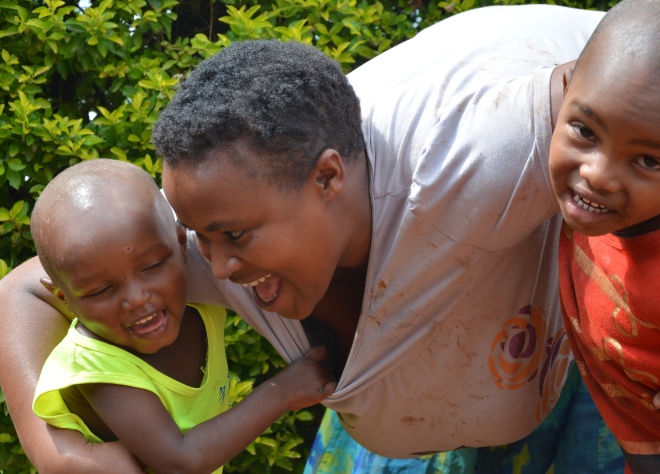

The weather has been cloudy, cool and sometimes wet. On Friday night I had to scurry about my round room at 2.30am moving belongings from drips and puddles, before moving the big bed away from spray through the banana thatch. It’s not a very luxurious life, living like an African! But I am here for the human warmth and love expressed so readily on this fascinating continent, not for comfort.
*
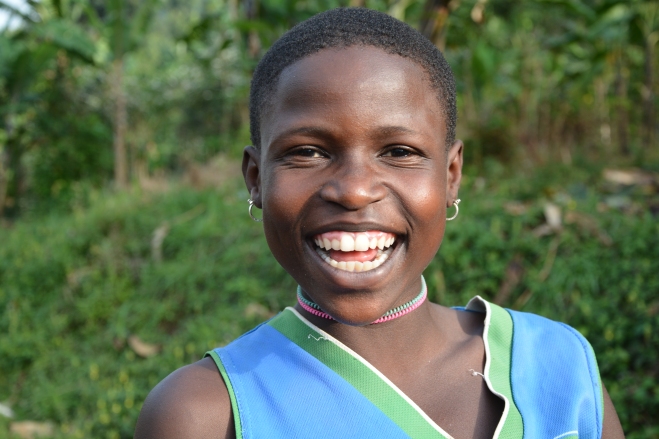
My virus test was valid for reentry to Kenya until the morning of Monday the 18th, so Sunday saw my journey home to Kitale on the wildly wonderful road around Mount Elgon, really one of my favourites. Fortunately, despite several heavy rains in Sipi in the past days, Sunday was bright and sunny and the difficult road dry. In rain this route is taxing indeed. I preferred to travel back through the small, friendly Suam border post, where I am known and recognised as the old mzungu on the piki-piki. They’re friendly officials, and that counts for a lot in these uncertain times.
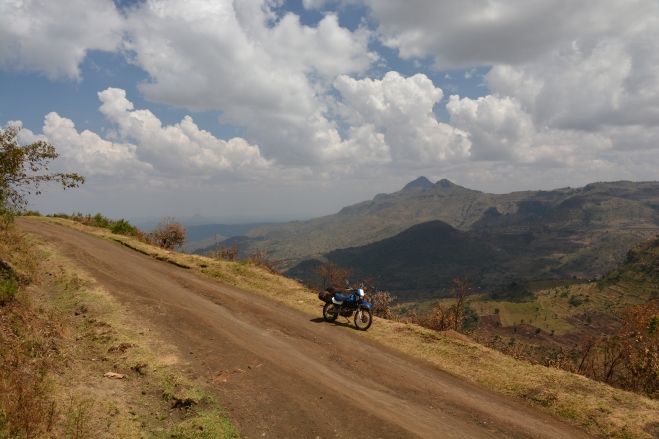
And what a fine ride it is! I’m now in good control of my little machine. It clocked up its 100,000th kilometre at the most notorious section of the lovely road. We have ridden over 27,000km together (17,000 miles). When I first rode the bike, I dismissed it as weak, slow and too light, and excruciatingly uncomfortable. Then Rico nobly scavenged a comfortable single seat from a derelict NGO machine in Congo and nobly fought it through Customs and Excise – partly because it was carried in a large plastic bag, banned in the countries en route! My rides changed after he fashioned the steel brackets and carrier to fit the new seat. I could now ride easily for long journeys. Now, four years on, I realise that this small 200cc Suzuki is the perfect bike for my travels. It is lightweight – a serious consideration as I get older – and it is a great off-road machine. It’s a bit tedious on long highways, to be sure, at 45mph, but I am not here to hurry. On the Sipi to Kitale road I can dance about on the versatile machine and have a lot of fun. I am now confident enough to watch the vistas stretching into the blue distance and even to wave at the clamouring children as I pass, weaving over hard trails and rocky hillsides. I have a wide smile on my face to be here, close to the Equator in rural Uganda.



*
So home to Kitale and beer on the porch with Rico, warm greetings from Adelight, Scovia, Marion and Maria and a time to reset for the next part of my journey. My charming, warmhearted Ugandan family long for me to return in February – with a new £50 virus test – to decorate the slightly wonky bar/ restaurant of crooked timbers, rough stones and mud plaster with our homemade natural colours. “Make it look traditional. Even if we have to invent the culture!” I told Alex.
It’s not my creative scenery design ideas they want. It’s my company. Love and warmth and family are expressed so generously and fulsomely here in Africa, Precious crying as I rode away up the red dusty track and Alex waving until I disappeared round the corner between the matoke trees. Only little Jonathan, JB, named in my honour, was happy to see the white skinned figure of fear ride away at last!
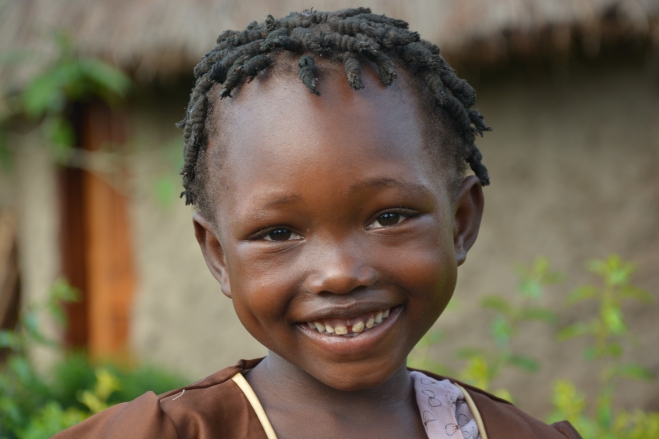

I thought of you last week when reading about the Ugandan election in the Guardian. Very interesting to read your impressions! Still rainy and dark here in Harberton! Take care.